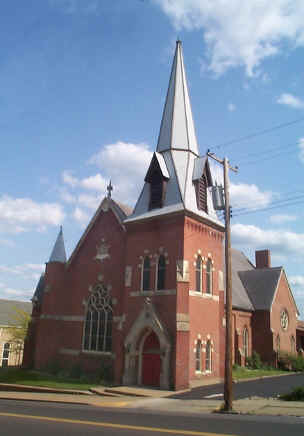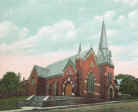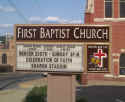|
First
Baptist Church, Sharon. That there is often a distinct cleavage among
new settlers on the line of denominational religion seems to be borne
out by several conspicuous cases in Mercer county. At the county seat
and the central part of the county almost the entire population were
divided among the different sects of Presbyterianism. In the upper
Shenango valley about Greenville the Methodists came as early and were
as prominent as any other denomination. While in Sharon, the
denomination that took the lead during the pioneer epoch was the
Baptists.
Rev. David Philips came to the Sharon community as a missionary in
1802, and after working in this vicinity about two years gathered the
Baptists into a regular organization in April, 1804. The family names
that appeared on the first roll of membership can readily be identified
with those of the pioneer settlers of this locality, including such as
the Morfords, Hoaglands, the Joneses, the Renos, Rigdons, Norths,
Bentleys and Budds, John Morford and Henry Hoagland were the first
deacons. For a number of years the 29th of April was celebrated as the
anniversary of the founding of this church, and was an occasion for the
assembling and the religious devotion and rejoicing of the people
through all the vicinity. In 1805 Thomas Jones and family were brought
through the wilderness from New Jersey to preach, though for the first
three years the congregation had noplace of assemblage except private
houses, barns and groves. Mention is
made in the
history of Sharon that William Budd donated a lot for a church and
graveyard, and the first building to be erected there was a log church
twenty by thirty feet in dimensions. This was
in 1807, and in the same
year the activities of the church spread to West Salem township, where
another church was organized and remained in relationship with Sharon
until 1826, the same pastor serving both.
|
First
Baptist Church in Sharon
Photo taken
in 2000
|
| What
the history of Mercer County 1888 says about the Sharon Baptist Church |
In 1825 the
church had seventy-five members. Then in 1828 the bonds of unity were
broken. The doctrines of Alexander Campbell made converts of
many in the Baptist society, which barely retained its
integrity as acorporation. A majority of the voting members remained
with the Baptists, so that they kept their church property, but for the
following twelve years the congregation made little progress. With the
pastorate of Dr. John Winter, in June, 1840, a new era began. March 31,
1843, the congregation was incorporated as the Regular Baptist Church
of the Borough of Sharon, the first board of trustees
including Edward S. Budd, Elam Bentley, John Hazen, Conrad G.
Carver and Thomas Clark. The log church that had served so long was
removed and the erection of a frame church (40 by 50 feet) was begun.
In the interval of building, the Baptists worshiped in the house of the
Protestant Methodists for a time, but the practices of the former as to
baptism and communion were so unacceptable to the latter that the
further rental of the church was refused. During the late forties the
Baptist Academy was established, and several other proofs of growth and
strength were seen. During the pastorate of S. H. Ruple
(1853-55) a division occurred in the church,but the
succeeding pastor, A. G. Kirk, effected a partial reconciliation,
thirty six members returning to the old body. During the war another
split occurred in the church, due to the differences of opinion as to
the issues of the war entertained by the members of the congregation.
At the close of the war the factions reunited and Dr. Winter again
became pastor, and a period of prosperity followed. The church was
remodeled and was dedicated a second time, in June, 1866.
When H. C. Hall became pastor in July, 1882, preparations were made to
build a new church. The result was the brick church which still stands
at 46 State street, which was constructed at a cost of about $15,000
and which was dedicated in June, 1884. A parsonage just west of the
church was built in 1866.
(Source: Twentieth
Century History of Mercer County,
1909, pages 274-275)
|




